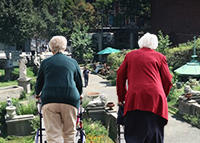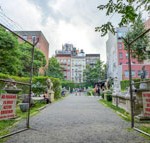Defenders of the Elizabeth Street Garden scored a victory in their long-running bid to block an affordable housing development in Little Italy.
State Supreme Court Judge Debra James has nullified the environmental impact statement for the Haven Green project, the latest blow for the city and a development group led by Philadelphia-based Pennrose in their now-five-year quest to get the project approved.
The city’s so-called Negative Declaration had asserted that the proposed 123-unit apartment building for formerly homeless seniors would have no negative impact on the surrounding area’s environmental and cultural resources.
James, who has taken two years to rule on a connected case about the project that was argued in tandem with this one, concluded that the study failed to fully consider the development’s impact on open space in the neighborhood. As the case stalled, critics and advocates duked it out in the court of public opinion.
Opponents of the project have long argued that it would destroy one of the few parks in Little Italy. Developers countered that their proposal would include 6,700 square feet of public open space and a 13,000-square-foot community garden, but James found that they failed to prove that the reduction in open space would be made up for by the new amenities.
James turned down the activists’ other arguments about the impact statement, including that the development would negatively impact neighborhood character.
As multifamily lending conditions worsened in recent months, Pennrose ramped up pressure for the court to act.
“It is imperative — particularly given the market changes and economic environment over the last several months — to resolve these issues promptly and allow the planned development to proceed,” Pennrose’s lawyer, Ken Fisher of Cozen O’Connor, wrote in a letter to James in September.
Fisher referred TRD to the city’s legal team for comment.
Read more



The project has been in the works for over a decade. Former Council member Margaret Chin first identified the park as a potential development site in 2012 as the city sought to address its housing shortage. Pennrose partnered with Habitat for Humanity and other nonprofit groups to design the project, but activists led by Joseph Reiver — the son of an art gallerist who formerly leased the city-owned parcel — organized a nonprofit and have mounted a legal defense ever since.
“With this decision, we hope that Mayor Adams and HPD Commissioner Adolfo Carrion will meet with us so that we may amicably resolve this issue,” Reiver said in a statement. His group, Friends of Elizabeth Street Garden, hopes to relocate the affordable housing to other sites like 388 Hudson Street, another city-owned parcel that is now slated to host 100 affordable units as part of the Soho/Noho rezoning.
A key aspect of the decision that has yet to play out is whether the city will be able to amend the environmental impact statement without having to send it to the Council again. The project will face long odds if it must be re-approved by the Council, as the local member has changed since the suit was filed: Chin, a Haven Green supporter, has been replaced by Christopher Marte, a staunch ally of the garden and frequent opponent of private development.
But the city has a strong track record of winning environmental review appeals, and is sure to appeal James’ decision, a move that will only further lengthen the odyssey.
